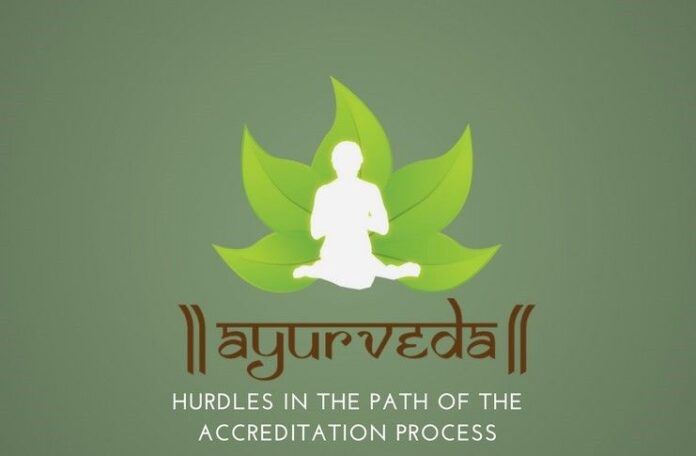
[dropcap color=”#008040″ boxed=”yes” boxed_radius=”8px” class=”” id=””]W[/dropcap]hile the Central Government is going all out to promote Ayurveda, hurdles are still being put by the bureaucracy to hinder the accreditation process of Ayurvedic hospitals. According to Ayurveda doctors, the present norms of National Accreditation Board for Hospitals and Healthcare Providers (NABH) are hard and fast and a copy-paste of the norms applicable to Allopathic hospitals. On Average, it takes no less than three years for the Ayurvedic hospitals to get accreditation from NABH.
Allopathic hospitals have clearly defined levels in the accreditation process, while no such standards exist for Ayurvedic hospitals.
The accreditation from NABH is helpful for hospitals to get a global reach. NABH is a constituent board of Quality Council of India (QCI), set up to establish and operate accreditation program for healthcare organizations. Till date, only 20 Ayurvedic hospitals have managed to pass the non-pliable accreditation process.
In Allopathic hospitals, there are different accreditation processes for big and small hospitals. This is not available to Ayurvedic hospitals. This is the main lacuna in the system, allege Ayurvedic practitioners.
The Private Ayurvedic Medical Practitioners Association (PAMPA) say that the norms set by the NABH were not suitable for ensuring quality standards of the Ayurvedic healthcare sector. The Association demands that the NABH’s accreditation system for the Ayurveda should be revamped and people from the sector should be involved in the accreditation process. They demand that Ayush Ministry should heed their demands for the betterment and development of Ayurveda.
The Association points out that while for allopathic hospitals with less than 50 beds, NABH has a separate category called Small Health Care Organisations (SHCO) where a hospital with up to 49 beds have to satisfy a lesser set of parameters, there was no such category for the Ayush sector despite several representations.
At present Ayurvedic hospitals have to meet 590 objectives to get NABH accreditation, which is totally impractical. A majority of the hospitals are in the category of around 50 beds or less and should be treated as small ventures. So it is a tedious thing for Ayurvedic hospitals to pass the accreditation norms, say the doctors.
Allopathic hospitals have clearly defined levels in the accreditation process, while no such standards exist for Ayurvedic hospitals. There are four types of classifications prescribed for Allopathic hospitals ranging from less than 50 beds to more than 100 beds. These hospitals have 41 to 105 Standard- Levels and 149 to 660 Objectives. But for Ayurvedic hospitals, there is only one category and 98 standards levels and 590 objectives to get the accreditation process.
Small Allopathic hospitals need to pay Rs.1000 for accreditation process and Rs.10000 is the Annual fee. Big hospitals application fee is Rs.40000 and Annual Fee is Rs. 1,50,000. But for Ayurvedic Hospitals, the Application Fee is Rs.20,000 and Annual Fee is Rs.60,000. The need of the hour and practical solution is to prescribe classifications for big and small Ayurvedic hospitals like Allopathic hospitals, with similar set of parameters.
The detailed representation of Ayurveda doctors in this regard is published below:
To Ensure Quality in Ayurvedic Industry by PGurus on Scribd
- Prime Minister Narendra Modi: A Gujju businessman who does not invest his precious time for a losing battle - April 13, 2024
- NIA arrests two accused Shazib and Taahaa in Bengaluru’s Rameshwaram Cafe blast case from Kolkata - April 12, 2024
- National Herald scam: Adjudicating Authority upholds Rs.752 crore assets attached by ED - April 11, 2024











I think ayurvedic medicine industry rather than seeking equal treatment on par with allopathic in govt regulatory bodies should instead take free market route. Govt regulatory bodies are good for nothing. How many times have we a heard a doctor’s licence being revoked for giving wrong treatment? Only in cases where one or more patients are dead or severely paralyzed and courts get involved. How many doctor’s have been punished for giving excessive or unnecessary treatment, I have never heard any such case. My brother was given pills to stop loose motions when he did not have any and was suffering stomach pain due to kidney stone, he had to be admitted late night on 4 different occasions due to continuous vomiting after taking pills. The doctor is a reputed cardiologist and he gave these pills right after seeing report clearly indicating kidney stones. We consulted other doctors to see if we can initiate any action for this malpractice, we were told that for such complaint another doctor has to provide the proof and practically no doctor will go against their own kind.
I can see many BAMS and BHMS doctors in my area prescribing over dosages of allopathic medicine rampantly and that too for extended time. I know multiple poor people suffer huge due to this but they cant get justice. Couple of years back we met a doctor in local hospital in Mumbai who was MBBS and yet did not know that pills for acidity need to be taken before meals, later the same hospital ended up killing an old man with weak heart history ,cause they made him climb two floors for reaching x-ray machine, he was originally admitted for malaria. His wife pleaded before doctor’s not to make him climb floors but doctors would not listen.Again no compensation and no action.
I am in favor of govt providing affordable medicine to poor, but it should not have monopoly on deciding what is good medicine or who and how medicine should be practiced. When Ayurveda flourished in old days ,did it require ruling patronage or regulations, I don’t think so. It is too late to take out govt monopoly in allopathic but I guess Ayurvedic industry has not been corrupted like allopathic yet and they can flourish well if govt is not allowed to mess it up.
Allopathy is excellent for emergencies. Doctors are highly meritorious and dedicated. As a result success reached skylevels in the area of surgery and replacement of organs. But the scenery in day to day treatment is poor because of the non availability of suitable medicines. Almost every medicine has side effects printed on the strip.
Whereas in Ayurveda or natural medicines no such side effects, though acts little late and this aspect too can beimproved with proper recognition by the Government.
For example, take the sugar/ sugar frees leads to killing of immunity any thus hundreds of diseases duly affecting even the heri deters. In place when we use Natural Stevia Sweetener is raising immunity without major side effects any is leading to almost disease free life.
Therefore there is an urgent need that the Govt should act in the right directions .